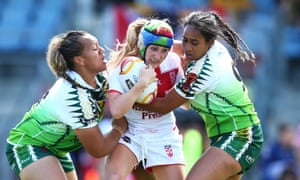odie Cunningham is rather busy. As well as playing full-back for St Helens and England, the 27-year-old is an ambassador for the 2021 Rugby League World Cup in England and a Super League pundit on Sky.
You’ve made a great impression as a pundit. What’s it been like?
“I’m really enjoying it. I was nervous at first. They never had female players on Sky until the last 12 months so it’s been a real honour to be asked. I’ve loved it. I’ve got such an appreciation of it now. When you have to break it down into each individual player, you realise how much work goes into it. It’s not just about knowing the main players but the whole squads, injury updates, and so on. I hope I can do more after the World Cup or once I’ve retired from playing.”
With big crowds and a tight four-way title race, the Women’s Super League seems to be going well…
“Absolutely amazingly. It’s made such a difference having each team linked to a Super League club. Castleford Tigers are one of our biggest rivals but they’re doing brilliantly. They’re really pushing their fanbase. They jad just short of 1,200 the other week, which is a record for a regular league game and a lot higher than a lot of men’s Championship attendances. Cas have been smart in when they put on the fixtures: they played on a Thursday night when there were no other fixtures. People who love rugby league don’t care if it’s men or women playing; they just want to go and watch. We’re showing that the interest is there.”
Attendances are similar to those in football’s Women’s Super League. Given the huge money invested in that, where is the limit for women’s rugby league?
“There isn’t a limit. That’s how it seems, anyway. Football set the stall out for women’s sport. It’s only the last two years that we’ve really started and backed women’s rugby league. If we can do that in 18 months, wow! Imagine what we can do in the next two and a half years building up to 2021? Growth can be rapid. Participation here more than doubled last year.”
What does being an ambassador for the Women’s World Cup 2021 mean?
“I’m very busy but life is very, very, interesting and I’m absolutely loving it! When I took up the role I had no idea what it would entail but it’s been really varied. I’m working day-to-day on the legacy education programme, getting the game into schools, working on cross-curricular rugby league-themed projects. I’ve not been on any of the legacy trips yet as I struggle to take time out in season but maybe I can get on the trip to Nigeria in October.”
The eight teams for the 2021 Women’s World Cup will be announced soon, with Brazil and USA possible contenders. Turkey, Italy, Burundi and Greece are playing now, too.
“There are so many countries emerging now who I didn’t even know played. It’s really exciting. Now is a perfect time for nations to start playing. We should expand and have at least two or possibly six more teams at the 2025 World Cup. Maybe Nigeria will be there.”
Part of the legacy project for the World Cup is to have 21,000 female players in the UK. How will the World Cup help that?
“When they announced where the games would be hosted [England will open the Women’s World Cup at Anfield and the final will be at Old Trafford] there was a real buzz. A couple of years ago, half the time nobody even knew there was a women’s game. But now we’re sharing the stadiums with England men, that’s a huge boost for women’s sport, not just rugby league. People know now women’s rugby league is a great sport to be a part of – and there’s a pathway to fantastic experiences at the end of it.”

How have things changed now you are no longer playing in a media vacuum?
“It’s a completely different ball game. We’ve got an added responsibility with that media coverage. We have to act professionally. No players actually get paid but we have to conduct ourselves on and off the pitch as if we are professionals, because that’s the only way to push the game forward. You might have had a sending-off previously when only the two teams knew about it, but now there’s media coverage. Equally, we’re seeing the best performances we ever had as everyone knows they’ve got to step up, train hard and be as much of an athlete as they possibly can be to put on the best performance.”
That is leading to personalities being promoted, such as yourself, Lois Forsell at Leeds Rhinos, and Georgia Roche and Kelsey Gentles at Castleford…
“We are seeing that. We’re getting media coverage and sponsorships from people who want to be associated with the women’s game, which creates opportunities for female players. I’m an absolute rugby league nerd and, although I don’t get paid to play, I have a job in the game, where I can hopefully make a difference to women’s rugby league and get as many women and girls playing as I can. Rugby league has changed my life for the better, a million times over.”
 Al-anwar Newspaper English news in Australia
Al-anwar Newspaper English news in Australia